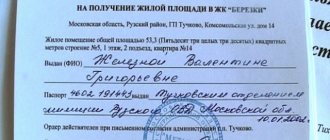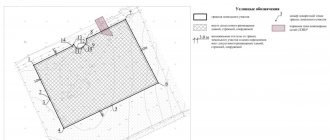Pros and cons of the professionImportant qualitiesWhere to studyReal estate management coursesSalary as of 10/06/2020
A property manager is a specialist who is engaged in the operation of buildings and structures in order to effectively use the property in the interests of the owner. The profession is suitable for those who are interested in work and farming (see choosing a profession based on interest in school subjects). In 2020, the ProfGid career guidance center developed an accurate career guidance test. He himself will tell you which professions are suitable for you, and give an opinion about your personality type and intelligence.
Short description
Property management includes a whole range of measures, starting from the formation of a strategy for the operation of a facility with the development of a budget to monitoring the safety and health of personnel. In the course of work, the property manager is in close contact with the owners of the property, tenants, contractors, utility services, and regulatory authorities. The manager’s responsibilities also include organizing the work of technical services to maintain buildings in working condition, their timely repairs and maintenance.
Many people mistakenly assume that property management specialists are the same as realtors. But this is absolutely not true. A property manager is a universal specialist: he is an economist, a lawyer, an architect, an ecologist, an appraiser, and a builder all rolled into one.
The range of professional responsibilities of a property manager may differ depending on the category of the property. There is a level classification for real estate:
- federal real estate;
- real estate of constituent entities of the Russian Federation;
- municipal real estate;
- real estate of enterprises;
- individual real estate properties.
By type, real estate is classified as follows:
- land resources;
- forest fund;
- residential real estate;
- non-residential real estate.
There are two types of real estate according to their purpose:
- operating real estate that is used to conduct business;
- investment property used only for profit.
To work successfully, a property manager must be competent in matters of financial, economic and stock management activities, master the techniques of engineering, technical and economic examination of objects, as well as modern methods of property management.
You can manage real estate in different ways by transferring it:
- for rent;
- in trust management;
- into economic management;
- to operational management.
The main goals of real estate management are to obtain maximum income from its operation and increase the value of the property.
General information about property management
Key features are due to the fact that real estate can be managed both for personal and social needs, as well as for investment and business activities.
At its essence, management is a complex of interrelated actions and operations in the field of operation of various types of buildings and structures, such as analysis of compliance with standards of the conditions for the delivery of premises, aimed at increasing the efficiency and reliability of their use in the interests of the owner or investor.
The property management system contains the following components:
- real estate management operations aimed at meeting the needs of the owner;
- a complex of regulation and control at the legislative level of the activities of all real estate entities, which is carried out by special government agencies;
- correct preparation and registration of the necessary package of documents for real estate.
Features of the profession
The activities of a property manager are carried out in three aspects:
- legal, the essence of which is the most rational use and distribution of rights to real estate;
- economic, which is the effective management of income and expenses during the operation of real estate;
- technical - constant maintenance of the control object in working condition.
Depending on the category and level of the property, the professional tasks of the manager can be very different.
The functional responsibilities of a property manager at any level begin with:
- conducting a comprehensive examination of investment decisions;
- comprehensive analysis of the condition of the property and development of a strategy for its management;
- development of economically sound technical specifications;
- design and organization of production systems;
- development and implementation of standards for the management and operation of real estate;
- development and control of budget execution for the operation of the property;
- conducting a technical and operational study of the facility and its acceptance;
- assessing the conditions of operation and maintenance of real estate.
Before directly leasing a property, the manager:
- organizes an advertising campaign for this object using the media and personal contacts;
- concludes all necessary agreements for the maintenance of the facility and monitors their implementation;
- organizes and controls production and economic activities;
- interacts with regulatory authorities;
- organizes repair work and, if necessary, reconstruction of the facility;
- ensures the operation of engineering and technical systems;
- engages in the selection of professionally suitable service personnel; arranges insurance for the property.
- After leasing the property, the manager is engaged in:
- building infrastructure management;
- supervising the work of personnel, if necessary, organizing their training and advanced training;
- monitoring compliance with labor protection and safety standards at the facility;
- maintaining financial statements for the property.
How to manage someone else's property and get good money - step-by-step instructions for beginners
This section is for those who want to engage in property management at a professional level. Of course, you can understand all the nuances of the management process only after training in this specialty. But it is useful to know the main steps of the process in advance.
Some people believe that property managers are the same as realtors. This is a wrong point of view. The manager is not only involved in advertising and searching for tenants, he is a universal specialist - an economist, lawyer, marketer, architect, even an ecologist and builder rolled into one.
And now - step-by-step instructions for novice managers
Step 1. We conclude a property management agreement
First you need to find an owner who will agree to transfer his property to you for management. Then an agreement is concluded with him, which clearly and without ambiguous wording stipulates the terms of cooperation - the amount of remuneration, the nature of reporting, the duration of the agreement, the responsibility of the parties in case of violation of obligations.
At this stage, it is useful to clarify the legal intricacies of the process in advance. This can be done quickly and inexpensively in the company Pravoved, which works online around the clock.
You just need to ask your question as correctly and competently as possible and get an answer from a qualified specialist in the field of housing law. Hundreds of professional lawyers and attorneys are constantly available on the site. More than 90% of consultations are given by them free of charge.
You can get competent legal support right now - just go to the Pravoved.ru website and spend a few minutes studying the functionality.
Or call the numbers provided.
You can also use the internal online chat.
Step 2. Finding tenants
So, you became a manager. Your next task is to find tenants. At this stage, you need to organize an effective advertising campaign for the property in order to rent it out at the maximum price. Your commission will depend on the amount of rent.
A contract must be concluded with tenants. It is clear that a professional will not hire the first people he meets as users, but will choose decent, solvent, and tidy tenants.
If you mistakenly place scandalous, problematic, cash-strapped clients in someone else’s apartment, you or your company will have to be responsible for their eviction and compensation for losses.
Example
The manager placed a non-working tenant in the apartment, a designer by profession, who assured that he would start freelancing in the near future.
However, a month later it turned out that the tenant’s main activity was meetings with friends and multi-day feasts with noise, music, drinks and cigarettes. The tenant was unable to pay for the next month, so we had to evict him and spend several days putting the living space in order.
Over time, you will learn to determine the degree of loyalty of a future tenant at first sight.
Step 3. We control the timely receipt of rent
The specialist constantly monitors that the rental conditions are strictly observed. Makes sure that the number of residents corresponds to the agreement, so that exactly the people who entered into the agreement live in the apartment.
And the main thing is that tenants pay rent on time. This determines whether the homeowner will be satisfied with your work. It is worth warning tenants in advance that payment cannot be delayed for a single day, otherwise the question of eviction will be raised. At this point, the manager must defend an extremely tough position.
Step 4. Organize the repayment of utility debts
Utility payments are also controlled by the manager. He can delegate this function to tenants, but the owner will ask him, and not the tenants, if something happens.
Keep all receipts and checks, check meter readings, and make monthly reports.
Step 5. Evict the tenants
The lease agreement has expired. Residents have the right to extend the agreement or move out of the apartment. In the first case, a new agreement is drawn up, in the second, good riddance, but first you need to settle all financial matters. Full payment, zero balance, no debts and “I’ll transfer it to your card in a week.”
Step 6. Order cleaning services
After eviction, the apartment must be put in complete order. There is no need to do the cleaning yourself; there are specialists for this. They will make cleaning faster, better and more professional. Expenses are the responsibility of the owner - just remember to keep your receipts.
Step 7. Organize minor routine repairs
If the plumbing or electrical wiring is out of order, if the wallpaper is peeling off or the refrigerator is not working well, the manager is obliged to fix the problem. Again, the owner pays for the repairs, but you need to keep documentary evidence of the malfunctions and their elimination.
Pros and cons of the profession
pros
- the constant demand for the profession and its high prestige in connection with the construction boom in all areas;
- stable and high income;
- opportunity for continuous development and career growth.
Minuses
- the highest level of responsibility;
- a wide range of responsibilities, which, however, in large companies with a rational organization of labor are divided between several specialists;
- possible dissatisfaction and claims from tenants or owners;
- the need to communicate with a wide range of people of different social statuses.
Property manager training
Courses
Russian Institute of Professional Education "IPO"
Russian Institute of Vocational Education “IPO” is recruiting students for the specialty “Real Estate Manager” through a distance program of professional retraining and advanced training starting from 9,900 rubles. Studying at the IPO is a convenient and quick way to receive distance education. 200+ training courses. 8000+ graduates from 200 cities. Short deadlines for completing documents and external training, interest-free installments from the institute and individual discounts. Contact us!
MAEO (International Academy of Expertise and Evaluation) (remote, on-the-job)
In this course, you can obtain a profession as a real estate management specialist remotely in 1-3 months. Diploma of professional retraining established by the state. Training in a completely distance learning format. The largest educational institution of additional professional education. education in Russia.
Universities
Moscow Open Institute
Management (Branch in Orenburg of the Moscow Institute of Technology)
Educational institution of higher education "Moscow Financial and Industrial University "Synergy"
General Management (Educational institution of higher education "Moscow Financial and Industrial University "Synergy")
Moscow Academy of Entrepreneurship under the Moscow Government
Economics (Moscow Academy of Entrepreneurship under the Moscow Government)
Moscow Humanitarian University, Moscow State University
Enterprise Economics (Faculty of Economics, Management and International Relations)
National Research University "MPEI"
Management (Engineering and Economic Institute of the National Research University "MPEI")
Basic principles of property management
Principles as a legal category determine the key features and direction of activity. They largely depend on the political and economic system, as well as many other factors.
Among the main principles of regulation of management activities are the following:
- Legality – full compliance of all documentation and the actual activities of the subjects with the established norms of legislation and the rule of law.
- Publicity and openness – availability of information about all participants in real estate management relations in the public domain.
- Competitiveness – the development of competition in the market, which contributes to the rapid development of the direction.
- Distribution of procedures and powers - adequate assignment of responsibilities for authorized bodies and the creation of special procedures for regulating their activities.
- Rationality - regulation by management in accordance with the needs of participants with the most beneficial distribution of functions.
- Compliance with rules and regulations - tolerance of competitors in the market, acceptable behavior and legal activities.
Their compliance is an integral part of the successful development of any direction, which is controlled by specialized, authorized government agencies.
Place of work
- Research and design institutes;
- state property and property committees;
- architecture department;
- organizations for state registration and land cadastre;
- examination enterprises;
- construction organizations;
- real estate companies;
- BTI - Bureau of Technical Inventory;
- investment funds;
- mortgage banks;
- organizations of housing and communal services - housing and communal services.
Career steps and prospects
Career growth is possible within the same company from specialist to investment professional. In addition, it is possible to transfer to the same position, but to another company at a higher hierarchical level. Large companies, as a rule, are interested in the professional growth of their employees and either send them to advanced training courses or develop and implement their own training programs for specialists.
Portrait of a modern property manager:
According to special studies, representatives of this profession in Russia are predominantly men (96%) aged 40-50 years (46%). 97% have higher education. The work involves constant travel, and therefore 90% of specialists have category B licenses.
What is included in property management services?
Residential management usually means the following type of work:
- Ensuring uninterrupted provision of utilities to all residents of the building;
- Management of the use of common and adjacent areas, including attics, basements, technical floors and the area next to the house;
- Management of periodic and major repairs of a residential building, as well as the necessary complex of technical work and work to carry out preventive maintenance and repair of basic engineering systems.
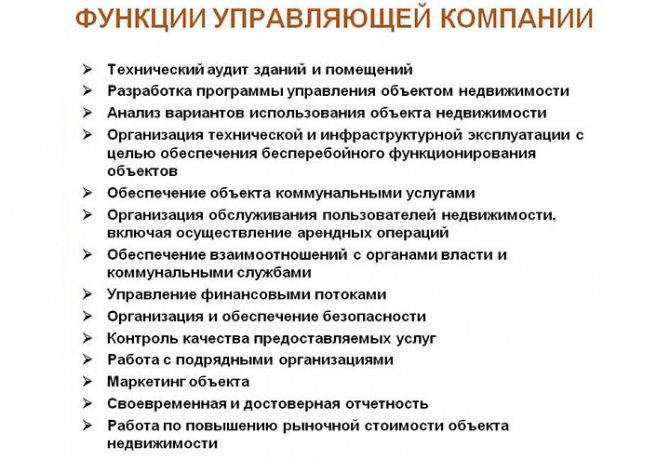
If we are talking about a typical apartment building, then there are three possible management methods that are proposed by the Housing Code of the Russian Federation:
Managing a group of owners of a given premises
This control option is suitable for small apartment buildings inhabited by several families. For example, if you live in a townhouse and are united with your immediate neighbors, whose cottages are located in the same residential complex.
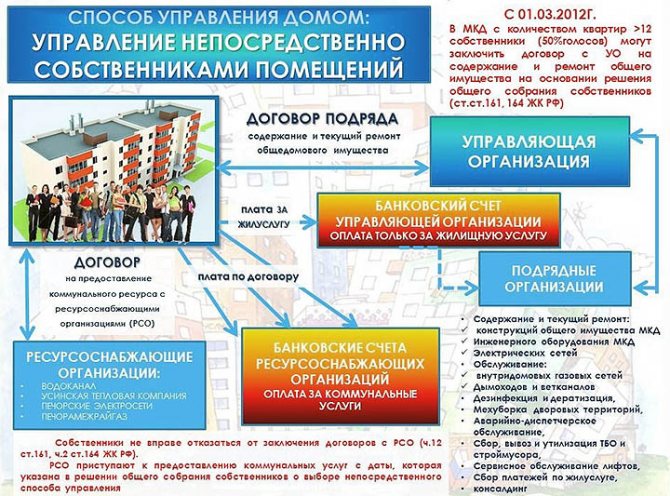
In this option, when from 2 to 5 families are involved in management and all expenses are divided among themselves in equal shares, this type of management will be the most effective and least expensive. Residents independently decide the whole range of issues, from hiring and firing service personnel to decisions on carrying out and organizing major repairs of the building.
How to sell a house quickly and profitably?
A house bought with a mortgage: Can it be sold or rented?
What benefits are there when purchasing land plots and acquiring land ownership?
Preparing surfaces before wallpapering. All the nuances
Modern houses and technologies. What new can developers offer?
How to sell a house, dacha, cottage if all the documents are not drawn up for them?
Blind area around the house. Why is it needed and how to do it correctly?
3 cases in life when you can’t do without a landscape designer
Real estate advertising: Online or Offline? Are billboards still effective?
Kindergarten in a cottage village. Pros and cons. Is it worth giving the child away or is it better to take him to the city?
Management with the assistance of a specialized Management Company
The undoubted advantages of this management method include the fact that you entrust all concerns related to managing and maintaining the proper condition of your home to a specialized company that has its own staff of professional employees and all the necessary equipment and resources.
The main difficulty is choosing the management company that suits you, which is due to the relatively recent emergence of such structures. Many newly created management companies do not have sufficient knowledge, experience and resources to effectively manage a residential building.
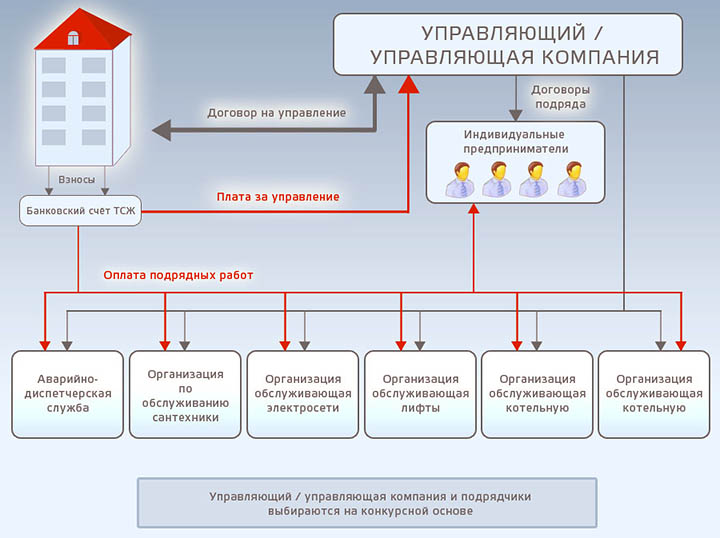
Management through an established homeowners association (HOA) or consumer cooperative
Today this is one of the most commonly used methods of managing an apartment building, which, in fact, is a certain combination of the first two types of management.
This structure is very similar to the structure of a dacha cooperative. An HOA is an officially registered legal entity that can only be created with the consent of at least 2/3 of the residents of an apartment building. The HOA has the opportunity to hire both permanent employees to perform a number of regular jobs (for example, cleaning entrances and garbage removal), and to attract a number of specialized organizations to perform one-time and specific technical work.
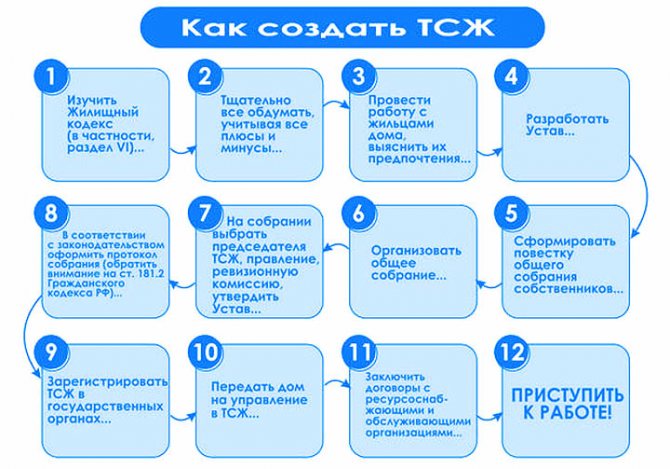
Like any other organization, a homeowners' association has its own constituent documents. A separate contract is concluded with each of the residents, which has a minimum validity period of one year and a maximum period of five years.
The main points of such an agreement include:
- mandatory description of the property that will be managed;
- a list of works that are implied by the very concept of management and include all types of repair and maintenance work;
- the procedure for making utility bills and paying for services for the maintenance of the premises by each apartment owner;
- the method and activities carried out to monitor the work of the HOA are determined.
The disadvantage of this method of management is that all decisions are made by the majority of apartment owners and are binding on the remaining residents, even if they do not agree with such a decision. This also includes the human factor, which can lead to various conflict situations between neighbors, since each resident will definitely have his own point of view on the optimal way to resolve the issue under discussion.
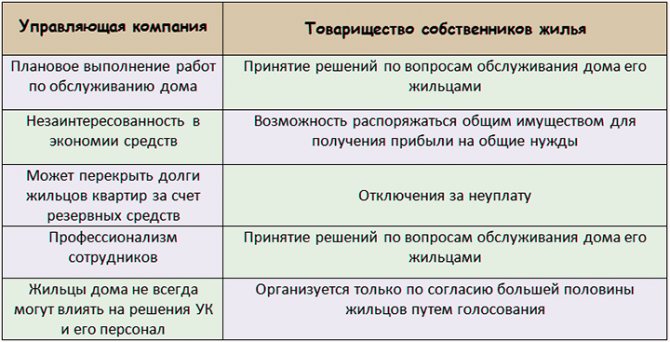
From the above it is clear that each of the existing methods of managing a residential property has its own advantages and disadvantages. But if with apartment buildings and holiday villages that have their own local government, everything is more or less clear, then the issue of managing commercial real estate is much more complex and multifaceted.
Of course, if you use your existing office, retail or industrial and warehouse space yourself to run your own business, it makes sense to resolve issues of timely maintenance of the building yourself or through the administrative director working for you (or an administration specialist, depending from your staffing table).
Problems of cleaning the premises and the surrounding area, repairing plumbing and minor repairs of furniture and equipment will have to be solved on a daily basis. This will be quite difficult to do if you own not one, but several premises. And in a situation where you rent out commercial space or permanently reside in another city, the most effective would be to attract specialists from a management agency. In the contract with the agency, you can clearly stipulate the range of services you need and the limits of the manager’s powers.
When choosing the trust management option, you can control all current processes and sign documents that are significant to you, or you can completely entrust all processes related to managing both the premises and extracting maximum profit from the use of commercial real estate to specialists who will regularly report on the work done.

When transferring the entire process of managing your property to such a specialized agency, the list of basic services will look like this:
- Conducting a detailed technical examination of the property in order to determine the optimal and most effective way to manage and conduct business.
- Creation of a master business plan and budget, including the main items of expenses and income;
- Conducting an advertising campaign to attract potential clients or tenants, depending on the chosen area of activity;
- Development of a set of measures to preserve and improve the operational characteristics of the property;
- Ensuring the security of the property;
- Resolving all issues related to maintaining the working condition of the premises, including repair work, replacement of plumbing and other engineering systems, cleaning of premises;
- Coordination of all necessary issues with local and state authorities;
- Maintaining all document flow in the field of finance and interaction with clients;
- Preparation and provision of regular reports on the work done.
The immediate course of action of the management company depends on the specifics of your business and the property itself. So, for example, if you are the owner of a shopping center, experts will help you choose:
- optimal option for calculating rent;
- select new tenants or ensure the most effective interaction with old ones;
- develop a strategy for additional advertising and marketing campaigns;
- if necessary, prepare a plan for the reconstruction of the building in order to increase the volume of usable space;
- We will develop a program to increase the loyalty of your regular customers and attract new ones.
In addition, you will be offered several options for increasing profitability (by changing the pool and level of tenants, placing additional advertising inside the shopping center and on the facade of the building, the appearance of additional retail-related services, etc.).
And, of course, all agencies involved in commercial real estate management offer full legal support and all necessary consultations.



